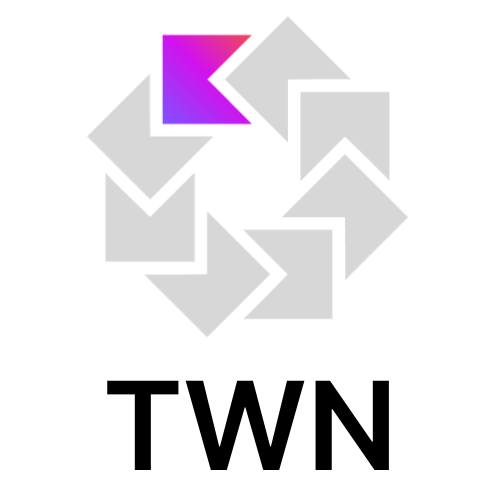Taiwan Kotlin User Group

Taiwan Kotlin User Group 的網站,在台灣推廣 Kotlin 程式語言,舉辦相關活動。如果對 Kotlin 有興趣,想要多瞭解一些,歡迎來我們的社群一起聚會!
Kotlin 慣用寫法
下面列出一些常見的 Kotlin 慣用寫法
建立 DTO
建立 DTO
(或稱 POJO,Plain Old Java Object)
data class Customer(val name: String, val email: String)
建立 Customer 類別
並包含下列函數:
- 內含屬性的 getter
- 如果屬性為
var會包含 setter equals()hashCode()toString()copy()- 對應屬性順序的
component1()、component2()⋯⋯
函數參數的預設值
fun foo(a: Int = 0, b: String = "") { ... }
過濾 list
val positives = list.filter { x -> x > 0 }
更短的寫法
val positives = list.filter { it > 0 }
確認某元素是否出現在集合內
if ("john@example.com" in emailsList) { ... }
if ("jane@example.com" !in emailsList) { ... }
字串樣板
println("Name $name")
檢查變數型態
when (x) {
is Foo -> ...
is Bar -> ...
else -> ...
}
建立唯讀 list
val list = listOf("a", "b", "c")
建立唯讀 map
val map = mapOf("a" to 1, "b" to 2, "c" to 3)
存取 map
println(map["key"])
map["key"] = value
遍歷 map
for ((k, v) in map) {
println("$k -> $v")
}
也可用來遍歷元素為 Pair 型態的 list
val list = listOf(
Pair("name", "Alice"),
Pair("age", 18)
)
for ((k, v) in list) {
println("$k -> $v")
}
k 和 v 都可以換成可讀性更高的名稱
像是 name 和 age
某範圍內迴圈
從 1 到 100
for (i in 1..100) { ... }
從 1 到 99,不包含 100
for (i in 1 until 100) { ... }
2 4 6 8 10
for (x in 2..10 step 2) { ... }
從 10 到 1
for (x in 10 downTo 1) { ... }
某範圍內判斷
if (x in 1..10) { ... }
Lazy property
val p: String by lazy {
// compute the string
}
擴充函數
可在原生型態上增添新函數
fun String.spaceToCamelCase() { ... }
"Convert this to camelcase".spaceToCamelCase()
建立單例
建立單例(singleton)
object Resource {
val name = "Name"
}
實例化抽象類別
abstract class MyAbstractClass {
abstract fun doSomething()
abstract fun sleep()
}
fun main() {
val myObject = object : MyAbstractClass() {
override fun doSomething() {
// ...
}
override fun sleep() { // ...
}
}
myObject.doSomething()
}
If-not-null 縮寫
如果 files 不為 null
印出 files.size
println(files?.size)
If-not-null-else 縮寫
如果 files 不為 null
印出 files.size
如果 files 為 null
印出 "empty"
println(files?.size ?: "empty")
為 null 執行特定行為
如果 values["email"] 為 null
拋出例外 IllegalStateException("Email is missing!")
val email = values["email"]
?: throw IllegalStateException("Email is missing!")
在可能為空的集合取出第一個元素
emails 為 List<String>
如果集合為空,則取出預設物件("")
val mainEmail = emails.firstOrNull() ?: ""
變數不為 null 時執行
value?.let {
// 變數不為 null 時執行此段落
}
Map nullable value if not null
假設 value 型態是 Int?
mapped 轉換成 List<Int>
如果 value 是 null
把 mapped 設置為 listOf(0)
val mapped = value?.let { listOf(it) } ?: listOf(0)
回傳 when 表達式
fun transform(color: String): Int {
return when (color) {
"Red" -> 0
"Green" -> 1
"Blue" -> 2
else ->
throw IllegalArgumentException("Invalid color")
}
}
try-catch 表達式
在 Kotlin try-catch 是表達式
回傳結果可以直接寫入變數
fun test() {
val result = try {
count()
} catch (e: ArithmeticException) {
throw IllegalStateException(e)
}
// Working with result
}
if 表達式
在 Kotlin if 是表達式
回傳結果可以直接寫入變數
fun foo(param: Int) {
val result = if (param == 1) {
"one"
} else if (param == 2) {
"two"
} else {
"three"
}
}
利用回傳 Unit 函數的生成器模式
fill() 的回傳值是 Unit
(對等其他語言的回傳 void)
下面建立大小為 size
全部值為 -1 的 IntArray
fun arrayOfMinusOnes(size: Int): IntArray {
return IntArray(size).apply { fill(-1) }
}
單一表達式的函數
fun theAnswer() = 42
上面等同於
fun theAnswer(): Int {
return 42
}
單一表達式函數搭配上其他慣用寫法
可以寫出更簡潔的程式
例如搭配上 when 表達式
fun transform(color: String): Int = when (color) {
"Red" -> 0
"Green" -> 1
"Blue" -> 2
else ->
throw IllegalArgumentException("Invalid color")
}
對某物件內多個函數進行呼叫
利用 with()
class Turtle {
fun penDown()
fun penUp()
fun turn(degrees: Double)
fun forward(pixels: Double)
}
val myTurtle = Turtle()
// 畫出大小 100 畫素的正方形
with(myTurtle) {
penDown()
for (i in 1..4) {
forward(100.0)
turn(90.0)
}
penUp()
}
設定物件屬性
利用 apply()
val myRectangle = Rectangle().apply {
length = 4
breadth = 5
color = 0xFAFAFA
}
在處理沒有出現在建構子內的屬性時
非常方便的寫法
Java 7 的 try-with-resources
val stream = Files.newInputStream(
Paths.get("/some/file.txt")
)
stream.buffered().reader().use { reader ->
println(reader.readText())
}
需要泛型類別資訊的泛型函數
假設 Gson 和 Gson.fromJson()
的宣告為
public final class Gson {
// ...
public <T> T fromJson(JsonElement json, Class<T> classOfT)
throws JsonSyntaxException {
// ...
使用時我們會需要 Class<T> 的資訊
利用 inline fun 和 reified 關鍵字
我們可以讓泛型函數內
取得泛型參數的類別資訊
inline fun <reified T: Any> Gson.fromJson(json: JsonElement): T =
this.fromJson(json, T::class.java)
這邊 <T> 型態是 Any
可以放入任意類別
使用起來非常簡潔
Gson.fromJson<MyDataClass>(json)
可為 null 的 Boolean
val b: Boolean? = ...
if (b == true) {
...
} else {
// `b` 為 false 或 null
}
交換變數
a = b.also { b = a }
標記程式未完成
利用 TODO() 函數
TODO() 執行時會拋出 NotImplementedError 中斷程式
TODO() 的回傳值是 Nothing
所以可以無視函數設定的回傳值
TODO()內可以宣告理由
fun calcTaxes(): BigDecimal = TODO("等會計部門回需求")
IntelliJ IDEA 的 kotlin plugin 認得 TODO()
並會自動將內容放在 TODO 工具視窗內
想了解更多嗎?
可以看看 Kotlin 語法特色
或加入 kotlin.tips 的 Kotlin 讀書會 !